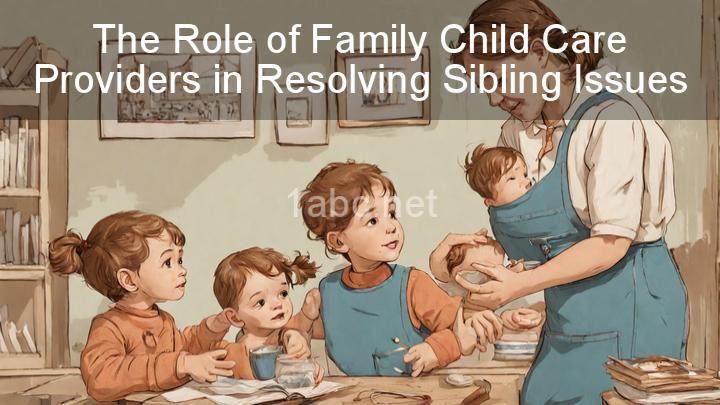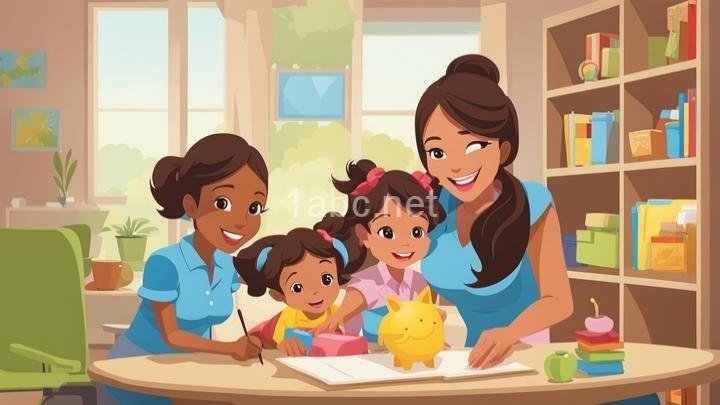The Role of Family Child Care Providers in Resolving Sibling Issues

Introduction:
Welcome, fellow family child care providers, to this informative and empowering blog post! We understand the vital role that you play in the lives of children under your care, and today we want to highlight the significant impact you can have on promoting positive sibling relationships in your family child care setting. Sibling issues are a common occurrence, and by addressing them effectively, you can contribute to the healthy development of the children in your care. So, let's dive in and explore the strategies you can implement to resolve sibling issues and foster harmonious relationships.
I. Understanding Sibling Issues:
Sibling issues refer to conflicts, tensions, and challenges that arise between brothers and sisters. These issues can have a profound impact on children's development, affecting their emotional well-being, social skills, and overall happiness. As family child care providers, it is essential to recognize the various causes of sibling conflicts, such as competition for attention, jealousy, differences in temperament, and power struggles. Additionally, understanding the challenges you may face in addressing these issues, including limited resources and time constraints, will help you develop effective strategies for intervention. By acknowledging the importance of intervening in sibling issues early on, you can promote healthier relationships between siblings and their overall well-being.
II. Building a Supportive Environment:
Creating a safe and inclusive space for siblings to express themselves is crucial in addressing and resolving conflicts. Start by setting clear expectations for behavior and ensuring that all children understand the rules of the family child care setting. Encourage open communication among siblings, allowing them to express their feelings and concerns freely. Actively listen to each child's perspective, validating their emotions and providing a supportive environment where they feel heard and understood. By establishing consistent rules and routines, you create a sense of stability and predictability that can help alleviate sibling conflicts.
III. Promoting Conflict Resolution Skills:
Teaching children effective ways of resolving conflicts is an essential skill that will benefit them throughout their lives. As family child care providers, it is our responsibility to guide children in learning conflict resolution strategies. Encourage problem-solving through negotiation, compromise, and empathy. Teach children how to express their feelings without resorting to physical or verbal aggression. By modeling appropriate behavior and presenting real-life scenarios, you can help children understand the consequences of their actions and develop empathy towards their siblings. Emphasize the importance of teaching conflict resolution skills as a preventive measure, rather than a reactive response to conflicts.
IV. Individualized Interventions:
Sibling issues may vary depending on the ages and needs of the children involved. It is essential to tailor your interventions accordingly. For younger children, who may struggle with sharing toys or personal space, use visual aids and clear instructions to guide them towards more cooperative behavior. Older children, on the other hand, may benefit from discussions on problem-solving techniques and the understanding of different perspectives. Regardless of age, positive reinforcement is a powerful tool in motivating desirable behavior. Praise and reward children when they engage in positive interactions with their siblings, reinforcing the importance of healthy sibling relationships. Balancing individual concerns while considering the collective well-being of siblings is crucial in creating a harmonious environment.
V. Collaboration with Parents/Guardians:
Maintaining open lines of communication with parents and guardians is essential in resolving sibling issues effectively. Parents play a significant role in shaping their children's behavior and can provide valuable insights into their dynamics at home. Encourage parents to share any concerns or observations they may have about their children's interactions. Regularly update parents on their children's progress in resolving conflicts, involving them in the conflict resolution process. By working together as a team, you can create a unified approach to addressing sibling issues and supporting positive sibling dynamics both in the family child care setting and at home.
Conclusion:
Family child care providers, we salute you for the important work you do in shaping the lives of young children. By understanding and addressing sibling issues, you can make a lasting impact on the emotional well-being and social development of the children in your care. Remember to create a safe and inclusive environment, promote conflict resolution skills, and tailor interventions based on the ages and needs of the children involved. Collaboration with parents and guardians is key to successfully resolving sibling issues. Together, we can empower children to develop healthy, supportive, and loving relationships with their siblings. Keep up the fantastic work, and continue making a positive difference in the lives of the children you care for.
FREQUENTLY ASKED QUESTIONS
What is the role of family child care providers in resolving sibling issues?
Family child care providers play a crucial role in resolving sibling issues among the children in their care. They should strive to create a nurturing and inclusive environment where children feel safe and supported. Some ways in which family child care providers can address sibling issues include:
- Promoting communication: Encouraging open and respectful communication among siblings can help them express their feelings and concerns. Providers can facilitate discussions and teach conflict resolution skills.
- Setting clear expectations: Establishing clear rules and guidelines for behavior can help prevent and address conflicts between siblings. Providers should ensure that these expectations are understood and supported by all children.
- Encouraging empathy and understanding: Helping children develop empathy and understanding towards each other can foster positive relationships and reduce conflicts. Providers can model empathy through their own behavior and encourage children to consider the feelings of their siblings.
- Individual attention: Giving each child individual attention and fostering their unique strengths and interests can reduce competition and jealousy, which are common causes of sibling conflicts.
- Teaching problem-solving skills: Providers can teach children age-appropriate problem-solving skills, such as compromise, active listening, and brainstorming solutions. These skills can empower siblings to resolve conflicts independently.
- Mediating conflicts: When conflicts arise, family child care providers should intervene calmly and without taking sides. They can encourage active listening, guide the discussion, and help siblings find a mutual resolution.
Overall, family child care providers have the responsibility to create a harmonious and supportive environment for all children in their care. By implementing strategies to address sibling issues, they can help foster positive relationships and promote healthy social interactions.
How can family child care providers help in promoting positive sibling relationships?
Family child care providers play a crucial role in promoting positive sibling relationships. Here are some ways they can help:
- Encourage cooperation and teamwork: Providers can plan activities that require siblings to work together, such as puzzles, building blocks, or team games. This fosters cooperation and teaches siblings to support each other.
- Teach conflict resolution skills: Providers can teach siblings how to express their feelings, listen to each other, and find compromises. They can provide guidance on resolving conflicts peacefully and encourage siblings to use these skills when disagreements arise.
- Promote individuality and respect for differences: Providers should celebrate each child's unique qualities and encourage siblings to appreciate and respect one another's differences. By creating an inclusive environment, providers can help siblings develop empathy and acceptance.
- Foster positive communication: Providers can model and encourage open and positive communication between siblings. They can provide opportunities for siblings to express their thoughts and feelings to each other, and guide them in using respectful language and tone.
- Set clear expectations and rules: Providers can establish clear expectations for behavior and rules that apply equally to all siblings. By creating a fair and consistent environment, they can reduce sibling rivalry and promote fairness.
- Provide individual attention: Siblings may sometimes feel overshadowed or ignored. Providers can ensure that each child receives individual attention and recognition, helping siblings feel valued and preventing feelings of jealousy or resentment.
- Promote siblings' involvement in each other's activities: Providers can encourage siblings to participate in each other's activities whenever appropriate. This can include involving siblings in each other's play or projects, which promotes bonding and shared experiences.
By implementing these strategies, family child care providers can play an active role in promoting positive sibling relationships and supporting healthy interactions between siblings.
What are some common sibling issues that family child care providers may encounter?
As a family child care provider, you may encounter various sibling issues. Some common ones include:
- Sibling rivalry: Siblings may engage in conflicts or competition, leading to jealousy or resentment towards each other.
- Power struggles: Siblings might vie for attention or control, leading to disagreements or attempts to manipulate situations.
- Age differences: Siblings of different ages may struggle to find common ground or have difficulty relating to each other, causing friction or misunderstandings.
- Comparison: Siblings may feel pressure to live up to each other's achievements or behaviors, leading to feelings of insecurity or resentment.
- Unequal treatment: Siblings might perceive that they are not treated fairly or receive different levels of attention or privileges, leading to feelings of favoritism or injustice.
- Different personalities: Siblings often have unique personalities, interests, and temperaments, which can result in clashes or difficulty finding common ground.
- Boundary issues: Siblings may struggle with personal space, sharing belongings, or respecting each other's boundaries, leading to conflicts or intrusion.
- Roles and responsibilities: Siblings may struggle to agree on division of tasks or responsibilities, leading to feelings of imbalance or burden.
Note: Markdown can be used to format this information in bullet points for better readability.
Can family child care providers help siblings develop conflict resolution skills?
Yes, family child care providers can play a crucial role in helping siblings develop conflict resolution skills. By creating a nurturing and supportive environment, family child care providers can teach siblings how to communicate effectively, listen to each other, and understand different perspectives. They can facilitate discussions, provide guidance on problem-solving techniques, and encourage empathy and understanding between siblings. Through planned activities and discussions, family child care providers can empower siblings to resolve conflicts peacefully and develop important social and emotional skills.




